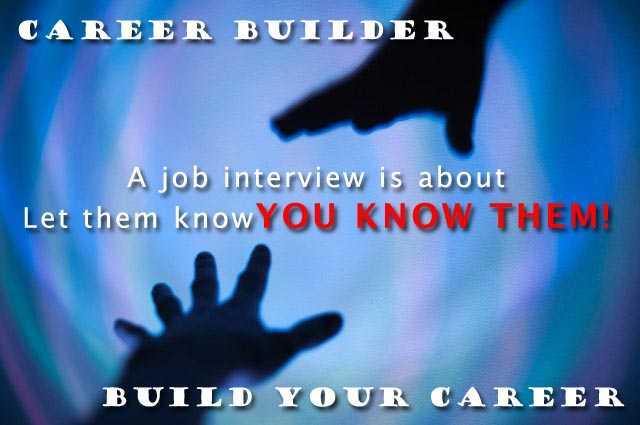
In this Career Builder show Robert Parkinson, CEO & Found of RMG Selection, is going to talk about interview preparations on company background! In a job interview, the interviewer might ask you a lot of questions. Some questions are really easy to answer, but some you might have no idea if it is good or not.
One of the most nerve-racking questions for interviewees is what they know about the company. Having checked up the official website and a few experiences sharing on Baidu or Google, do you think that you have prepared enough for this question?! If you do, think again! If you don’t think so, congratulations that you will find out what you need in this Career Builder session. The following questions and key points will guide you through this show.
- Why should job seekers prepare for company background information?
- If you prepare well, you will get yourself in front of the queue among all the job applicants.
- Talking about relative information of the company at the right time will impress the interviewer.
- If interviewees mess up the information of their potential employer, is that an unforgivable mistake?
- The answer depends on how the interviewee mess it up.
- Interviewer and employers get really irritated when interviewees pretend they have checked up the company background information, but in fact they didn’t do the homework.
- If interviewees have not checked any company background information, then the best they can do is to be honest with interviewers.
- If the interviewee tells the interviewer that s/he has little information about the company background but strong interest in the job, would the company still be willing to employ him/her?
- If an interviewee is truly interested in the company, it is not possible that they don’t check anything about the company background.
- Limited access to company background information is not an excuse. 18 years ago when everyone has to queue up for 5-10 minutes internet surfing was understandable because of limited resource, but that is not reasonable in the 21st
- Is there any company background information that employers/interviewers expected interviewees to know?
- This depends on whom the interviewee is going to meet. The key ask the right question/say the right thing to the right person.
- If the interviewee is meeting a junior HR who is just graduated from university for about 6 months, s/he will follow a checklist in the interview. Such as your period of experience, skills, certificates etc.
- If the interviewee will meet a CFO/ a high level staff in a listed company, then they expect the interviewee know the share price, the annual report, the marketing strategy etc.
- If the interviewer finds some negative about the company, maybe a scandal or a shortfall, can the interviewee mention that they can help the workflow on those?
- That is actually why companies should work with qualified third party recruiters; because they can help interviewers explain the negative side of restore the company image by calling or meeting the candidate.
- There might be misunderstanding of negative information. To bring these up, interviewees must measure who they are talking to in the interview.
- What kind of information should interviewees prepare before they go to job interviews?
- An interview is like a sale pitch. It is about selling yourself. Figure out what the interviewer expect you not to know is the key.
- Know the position and the job content is a must.
- Extra market information about competitors and market share.
- Financial performance of the company or the update to date reference check of the company.
- Suit up for the interview.
- Is there any difference between local companies and transnational companies when it comes to what they expect interviewees know about them?
- Interviewers overseas are very interested in the general picture of candidates.
- Interviewers from transnational companies also check if candidates fit the company from culture very carefully.
- Chemistry is another important factor that western style interviewers care.
- Chinese interviewers actually really drill down to the detail. For example, if an interviewee had 3 months gap between two jobs. They have to know especially what they do in that period and why.
- Like ticking boxes, a lot of junior HR people check interviewees based on a checklist.
- Having said that, you also have to take the fact that there are British, French, German, Spanish, American companies interviewing people in differently ways into consideration. Simply putting companies in Chinese and non-Chinese is not fair.
- To the question of “What do you know about our company”, what is way to begin?
- Brief & concise
- Drop relative information about the company. Here is an interview example from RMG Selection.
“RMG is a recruiting firm. You did a lot in the recruitment industry. You have a lot of employees in China. And you won the Best Job Board award in Asia last year”.
- Give 1 or 2 examples of what has the company done to show that you have further researches on the company background.
“I read that one of your company values is teamwork. That is particularly important to me. That is also why I come here for an interview today. Let me give you an example……”
- Use the FBA (Feature, Benefit, and Accomplish) method to explain how you are interested in the company.
- Make sure the answer to this question is within 1 minute.
- Do you think using flattering tone is good for the interview?
- We use a lot of different strategies in an interview.
- If the company is genuinely compelling to you, then highlight it in a subtle and unstated way is not going to hurt you.
- But if it is not genuinely, say you just make it up, it is not going to be helpful in the interview.
Listen to the radio show on CRI: http://english.cri.cn/7146/2015/03/18/3481s870588.htm